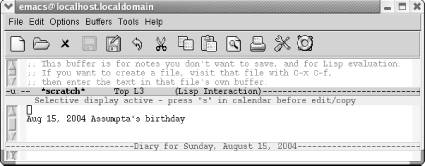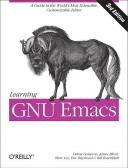Книга: Learning GNU Emacs, 3rd Edition
5.5.2.3 Displaying diary entries
5.5.2.3 Displaying diary entries
If you want to review the diary entries for a given date, press d from the calendar. In order to see the whole diary file, press s from the calendar. If you want today's diary entries to display automatically when you start Emacs, add this line to your .emacs file:
(diary)
That way, when you start up Emacs on a day for which there is a diary entry, the diary entry displays automatically. For example, let's say you marked your best friend's birthday some time ago, and today is the day. When you start Emacs, the screen would look like this:
You start Emacs.

Emacs displays the diary entry for your friend's birthday.
If there are no diary entries for a given day, the diary is not displayed. If you start Emacs with two files so that you are editing in two windows, the diary is also not displayed.
If you have already put in a (calendar) entry in your .emacs file to have the calendar displayed automatically, the calendar supersedes the diary, and you'll have to remove the calendar if you prefer to see the diary instead.
To mark dates with diary entries in red, press m from the calendar. To remove the marks, press u. (This command removes highlighting for diary entries as well as for holidays.)
Table 5-5 summarizes the calendar and diary commands.
Table 5-5. Holiday and diary commands
| Keystrokes | Command name | Action |
|---|---|---|
| p d | calendar-print-day-of-year | Display the day of the year this is (for example, Day 364 of 365). |
| p o | calendar-print-other-dates | Display information about this date for all calendars. |
| Space | scroll-other-window | Scroll the other window. |
| q | exit-calendar | Quit calendar. |
| a Holidays ? For Window | list-calendar-holidays | Display holidays for calendar period shown. |
| h Holidays ? For Cursor Date | calendar-cursor-holidays | In the minibuffer, display holiday information for the day the cursor is on. |
| x Holidays ? Mark | mark-calendar-holidays | Display holidays in a different typeface, color, or with an asterisk beside them. |
| u Holidays ? Unmark Calendar | calendar-unmark | Remove marks for holidays and diary entries (opposite of x command). |
| i w Diary ? Insert Weekly | insert-weekly-diary-entry | Add a weekly entry based on the day of the week. |
| i y Diary ? Insert Yearly | insert-yearly-diary-entry | Add an annual entry. |
| i d Diary ? Insert Daily | insert-diary-entry | Add an entry for a particular day. |
| i m Diary ? Insert Monthly | insert-monthly-diary-entry | Add an entry for the day of the month. |
| i c Diary ? Insert Cyclic | insert-cyclic-diary-entry | Add an entry to recur every n days. |
| i a Diary ? Insert Anniversary | insert-anniversary-diary-entry | Add an annual entry (the year is included for reference). |
| i b Diary ? Insert Block | insert-block-diary-entry | Add a block entry. |
| m | mark-diary-entries | Display diary entries in a different typeface, color, or with a plus sign beside them. |
| d | view-diary-entries | Display diary entries for the current date. |
| s Diary ? Show All | show-all-diary-entries | Display diary file. |
| M-= | calendar-count-days-region | Count the number of days in a region. |
| M Moon ? Lunar Phases | calendar-phases-of-moon | Display phases of the moon for a three-month period. |
| S | calendar-sunrise-sunset | Given longitude and latitude, display sunrise and sunset times for the current date. |
| C-Space or C-@ | calendar-set-mark | Mark regions by time rather than horizontally. |
- 5.5.2 Using the Diary
- The conntrack entries
- Displaying Interface Statistics
- Displaying Free and Used Memory with free
- Displaying the Routing Table
- Displaying Connections
- Connecting the Virtual Subsidiary Network
- Viewing disk quota entries
- Creating disk quota entries
- Deleting disk quota entries
- Building the Directory Tree and Displaying Images
- Displaying Publisher's Name




